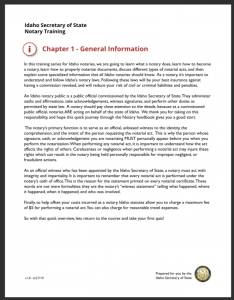Idaho Secretary of State
Notary Training
![]()
Training Video
Training Transcript
 Chapter 1 – General Information
Chapter 1 – General Information
In this training series for Idaho notaries, we are going to learn what a notary does, learn how to become a notary, learn how to properly notarize documents, discuss different types of notarial acts, and then explain some specialized information that all Idaho notaries should know. As a notary, it’s important to understand and follow Idaho’s notary laws. Following these laws will be your best insurance against having a commission revoked, and will reduce your risk of civil or criminal liabilities and penalties.
An Idaho notary public is a public official commissioned by the Idaho Secretary of State. They administer oaths and affirmations, take acknowledgements, witness signatures, and perform other duties as permitted by state law. A notary should pay close attention to the details, because as a commissioned public official, notaries ARE acting on behalf of the state of Idaho. We thank you for taking on this responsibility, and hope this quick journey through the Notary handbook gives you a good start.
The notary’s primary function is to serve as an official, unbiased witness to the identity, the comprehension, and the intent of the person requesting the notarial act. This is why the person whose signature, oath, or acknowledgement you are notarizing MUST personally appear before you when you perform the notarization. When performing any notarial act, it is important to understand how the act affects the rights of others. Carelessness or negligence when performing a notarial act may injure these rights which can result in the notary being held personally responsible for improper, negligent, or fraudulent actions.
As an official witness who has been appointed by the Idaho Secretary of State, a notary must act with integrity and impartiality. It is important to remember that every notarial act is performed under the notary’s oath of office. This is the reason for the statement printed on every notarial certificate. These words are not mere formalities; they are the notary’s “witness statement” telling what happened, where it happened, when it happened, and who was involved.
Finally, to help offset your costs incurred as a notary, Idaho statutes allow you to charge a maximum fee of $5 for performing a notarial act. You can also charge for reasonable travel expenses. So with that quick overview, lets return to the course and take your first quiz!
v1.0 – 6/27/19

 Prepared for you by the
Prepared for you by the
Idaho Secretary of State


